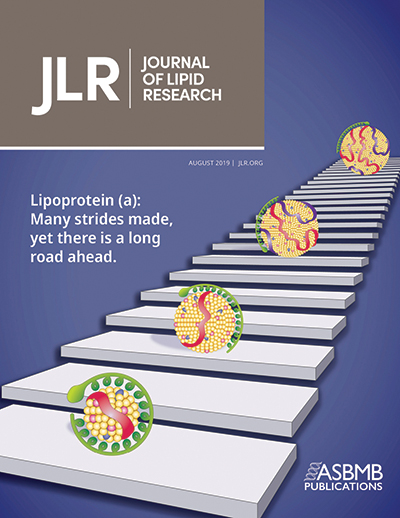JLR: Virtual issue sheds light on a key risk factor for heart disease
Because lipids such as cholesterol and triglycerides are hydrophobic and tend to clump up, rather than dissolve, in water, they need help getting around inside the body. Lipoproteins are complex assemblies with hydrophilic outer shells that package hydrophobic lipids in their core, allowing them to hitch a ride through the bloodstream. These delivery particles play an important role in the absorption of dietary lipids from the small intestine and also transport lipids to and from the liver.
 The cover of the JLR virtual issue depicts the Lp(a) particle following the steps of a walking path, getting bigger as the road stretches into infinity.
The cover of the JLR virtual issue depicts the Lp(a) particle following the steps of a walking path, getting bigger as the road stretches into infinity.
High levels of one particular class of lipoprotein, known as lipoprotein (a), are associated with atherosclerosis, inflammation and thrombosis, but no treatments are available in the clinic that specifically lower Lp(a), and much of what governs Lp(a) assembly is still unknown.
A new virtual issue from the Journal of Lipid Research titled “Lipoprotein (a): Many strides made, yet there is a long road ahead” explores the past, present and future status of Lp(a) research and showcases researchers pushing this field forward. This issue was assembled by JLR Junior Associate Editor Gissette Reyes-Soffer from Columbia University Irving Medical Center in New York City.
Several papers collected in this issue offer insights into how various Lp(a)-reducing drugs work. In one of these studies, Enkhmaa Byambaa and colleagues at the University of California, Davis, and the University of Hong Kong demonstrated that alirocumab — an inhibitor of the lipid-binding enzyme PCSK9 — could lower Lp(a) levels regardless of the isoform of proteins in Lp(a).
A study by Frederick Raal and an international team of researchers suggests that another PCSK9 inhibitor, evolocumab, reduces Lp(a) levels partly by increasing the expression of LDL receptors.
Elisa Waldmann and Klaus Parhofer at Ludwig Maximilian University of Munich wrote a review that discusses apheresis as an effective method of selectively clearing Lp(a) from the blood and reducing risk of cardiovascular disease.
Another review, penned by George Thanassoulis at McGill University, describes the association of Lp(a) with aortic valve disease and outlines steps toward developing much-needed preventive and therapeutic strategies.
Enjoy reading ASBMB Today?
Become a member to receive the print edition four times a year and the digital edition monthly.
Learn moreGet the latest from ASBMB Today
Enter your email address, and we’ll send you a weekly email with recent articles, interviews and more.
Latest in Science
Science highlights or most popular articles

Avoiding common figure errors in manuscript submissions
The three figure issues most often flagged during JBC’s data integrity review are background signal errors, image reuse and undeclared splicing errors. Learn how to avoid these and prevent mistakes that could impede publication.

Ragweed compound thwarts aggressive bladder and breast cancers
Scientists from the University of Michigan reveal the mechanism of action of ambrosin, a compound from ragweed, selectively attacks advanced bladder and breast cancer cells in cell-based models, highlighting its potential to treat advanced tumors.

Lipid-lowering therapies could help treat IBD
Genetic evidence shows that drugs that reduce cholesterol or triglyceride levels can either raise or lower inflammatory bowel disease risk by altering gut microbes and immune signaling.

Key regulator of cholesterol protects against Alzheimer’s disease
A new study identifies oxysterol-binding protein-related protein 6 as a central controller of brain cholesterol balance, with protective effects against Alzheimer’s-related neurodegeneration.

From humble beginnings to unlocking lysosomal secrets
Monther Abu–Remaileh will receive the ASBMB’s 2026 Walter A. Shaw Young Investigator Award in Lipid Research at the ASBMB Annual Meeting, March 7-10 in Washington, D.C.

Chemistry meets biology to thwart parasites
Margaret Phillips will receive the Alice and C. C. Wang Award in Molecular Parasitology at the ASBMB Annual Meeting, March 7-10 in Washington, D.C.

